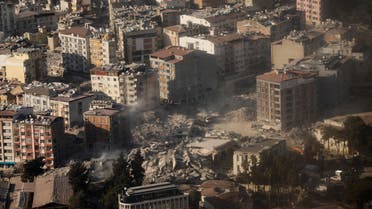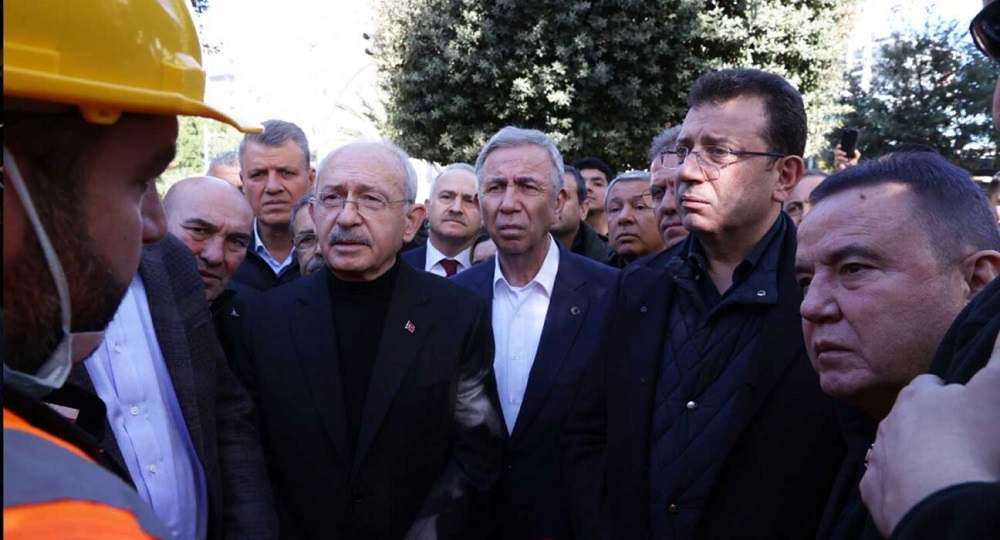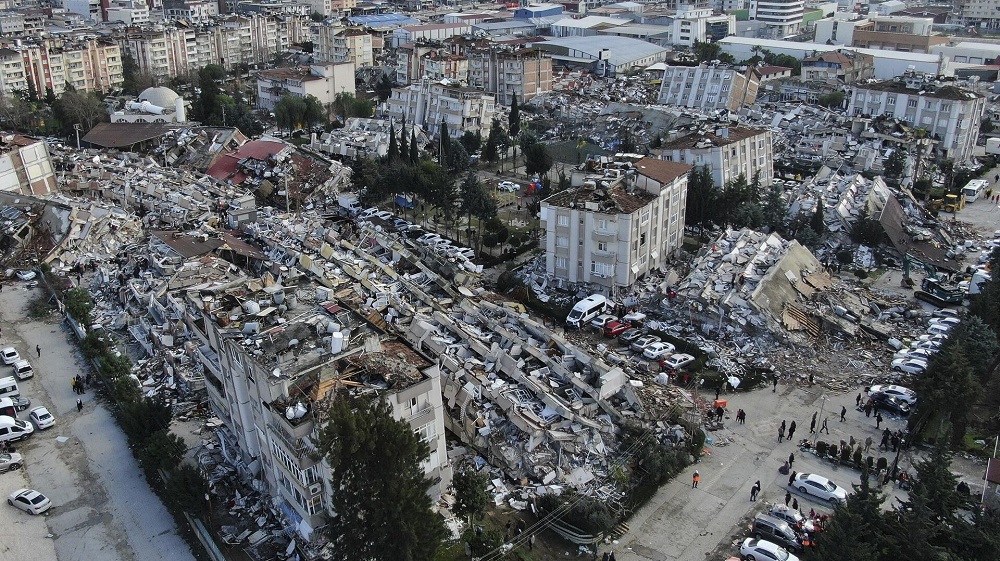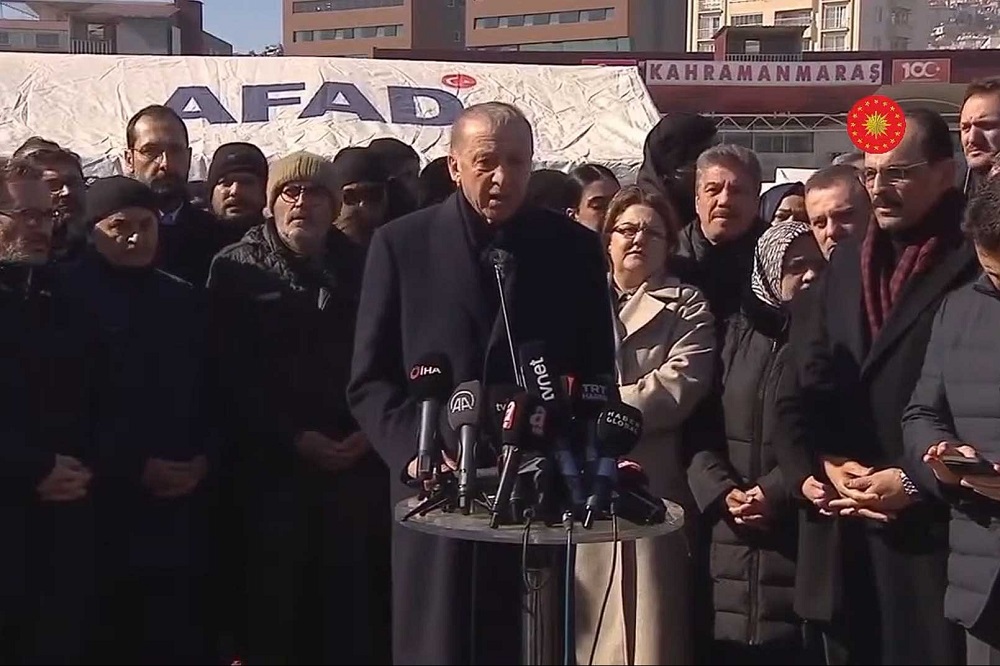Earthquakes and elections in Turkey
JAMnewsIstanbul
On the night of February 5-6, at 04:17 local time, a magnitude 7.7 earthquake occurred in the city of Marash located in southern Turkey.
Just nine hours after the first tremors, a second earthquake of magnitude 7.6 took place very close to the epicenter, which led to the largest human tragedy in the history of the Republic of Turkey, which also affected Syria.
Poor level of readiness
Though geologist Celal Shenger and prominent specialist Naji Geryur had been warning everyone for years about a possible large earthquake in this region, President Recep Tayyip Erdogan and the country’s Interior Minister Suleiman Soil had to admit that preparedness for the event was poor.
According to the latest information, more than 44,000 died in the earthquake in Turkey, and about 7,000 more in Syria. The earthquake hit close to the presidential and parliamentary elections in Turkey.
After the earthquake near the Sea of Marmara in August 1999, in which about 17,000 people died, the requirements for the construction of residential buildings were changed in Turkey, with more plans for anti-earthquake measures. But discussion about corruption in this sector is prominent.
Mixed reactions from politicians
The leader of the main opposition Republican People’s Party (CHP), Kemal Kılıçdaroğlu, made tough statements in the first days of the aftermath. In a speech, he declared that he was not going to “stand on par with this government and share the responsibility for what happened.” On the same day, President Erdogan phoned all opposition leaders, but ignored the chairman of the CHP.
Kılıçdaroğlu took it upon himself to call municipalities under the control of his party to help out, although the government had ordered everything be coordinated therewith.
In the midst of rescue efforts in the regions affected by the quake, the Turkish government decided to close access to Twitter. The most widely used social network in the country served as a means of coordination for the rescue teams, and there were many cases of people trapped under the rubble tweeting their location.
The mayor of Istanbul, oppositionist Ekrem Imamoglu, said: “On such a tragic day, the president should not impose bans just because of criticism against him. Turkey needs leaders who are not afraid of criticism and who are confident in themselves.”
The most popular internet forum in Turkey with 25 years of history, Ekşi Sözlük (The Sour Dictionary), was also blocked at the behest of the government.
When are elections?
Another acute issue after the earthquake was the timing of the elections. Officially, they were scheduled for June 18 last year, but Erdogan and his coalition ally Devlet Bahceli expressed a desire to move the elections to May 18. But so far there has been no final decision.
JAMnewsIstanbul
On the night of February 5-6, at 04:17 local time, a magnitude 7.7 earthquake occurred in the city of Marash located in southern Turkey.
Just nine hours after the first tremors, a second earthquake of magnitude 7.6 took place very close to the epicenter, which led to the largest human tragedy in the history of the Republic of Turkey, which also affected Syria.
Poor level of readiness
Though geologist Celal Shenger and prominent specialist Naji Geryur had been warning everyone for years about a possible large earthquake in this region, President Recep Tayyip Erdogan and the country’s Interior Minister Suleiman Soil had to admit that preparedness for the event was poor.
According to the latest information, more than 44,000 died in the earthquake in Turkey, and about 7,000 more in Syria. The earthquake hit close to the presidential and parliamentary elections in Turkey.
After the earthquake near the Sea of Marmara in August 1999, in which about 17,000 people died, the requirements for the construction of residential buildings were changed in Turkey, with more plans for anti-earthquake measures. But discussion about corruption in this sector is prominent.
Mixed reactions from politicians
The leader of the main opposition Republican People’s Party (CHP), Kemal Kılıçdaroğlu, made tough statements in the first days of the aftermath. In a speech, he declared that he was not going to “stand on par with this government and share the responsibility for what happened.” On the same day, President Erdogan phoned all opposition leaders, but ignored the chairman of the CHP.
Kılıçdaroğlu took it upon himself to call municipalities under the control of his party to help out, although the government had ordered everything be coordinated therewith.
Kemal Kilicdaroglu in the disaster area. Photo: open sources
According to journalist Altan Sanjar, Kılıçdaroğlu’s attitude in the first hours caused a stir within the party. Some advisers asked the CHP chairman to wait a few days, because “such aggression may cause an unexpected reaction.” But Kılıçdaroğlu went ahead anyway.
Meral Akshener, the chairman of the Good Party (İYİ Parti), reacted a little differently to what was happening. In a first statement after the earthquake, she stressed that “today we will be silent and listen to the voice of the state.”
Meanwhile, the former leader of the Kurdish HDP party, Selahattin Demirtas, who is under arrest, expressed support for the position of Kılıçdaroğlu. Through his lawyer he released a statement in which he commented on the CHP leader’s statement with the words “strong solidarity and strong political will.”
But most tension in the political life of the country was introduced by President Erdogan in a speech after the quake in which he said the following: “everything that is said and done today we will put in our notebook, and when the time comes, we will open it.”
Will the catastrophe in Turkey change the country's position in the South Caucasus? Comment from Baku
Will the recent tragedy affect Turkey’s attitude towards regional and global politics?
According to journalist Altan Sanjar, Kılıçdaroğlu’s attitude in the first hours caused a stir within the party. Some advisers asked the CHP chairman to wait a few days, because “such aggression may cause an unexpected reaction.” But Kılıçdaroğlu went ahead anyway.
Meral Akshener, the chairman of the Good Party (İYİ Parti), reacted a little differently to what was happening. In a first statement after the earthquake, she stressed that “today we will be silent and listen to the voice of the state.”
Meanwhile, the former leader of the Kurdish HDP party, Selahattin Demirtas, who is under arrest, expressed support for the position of Kılıçdaroğlu. Through his lawyer he released a statement in which he commented on the CHP leader’s statement with the words “strong solidarity and strong political will.”
But most tension in the political life of the country was introduced by President Erdogan in a speech after the quake in which he said the following: “everything that is said and done today we will put in our notebook, and when the time comes, we will open it.”
Will the catastrophe in Turkey change the country's position in the South Caucasus? Comment from Baku
Will the recent tragedy affect Turkey’s attitude towards regional and global politics?
Prohibitions amid natural disaster
In the midst of rescue efforts in the regions affected by the quake, the Turkish government decided to close access to Twitter. The most widely used social network in the country served as a means of coordination for the rescue teams, and there were many cases of people trapped under the rubble tweeting their location.
The mayor of Istanbul, oppositionist Ekrem Imamoglu, said: “On such a tragic day, the president should not impose bans just because of criticism against him. Turkey needs leaders who are not afraid of criticism and who are confident in themselves.”
The most popular internet forum in Turkey with 25 years of history, Ekşi Sözlük (The Sour Dictionary), was also blocked at the behest of the government.
When are elections?
Another acute issue after the earthquake was the timing of the elections. Officially, they were scheduled for June 18 last year, but Erdogan and his coalition ally Devlet Bahceli expressed a desire to move the elections to May 18. But so far there has been no final decision.
Erdogan’s speech in the disaster zone. Photo: open sources
Bulent Arinc, a member of the ruling party, who worked as speaker of parliament for five years and another six as deputy prime minister, said the elections should be postponed for one year.
According to the Turkish Constitution, elections can be postponed only in wartime. To which Arinc replied that “the Constitution is not an commandment in the Koran, and it can be changed.”
Erdogan is said to have expressed bewilderment at Arinc’s speech. And Erdogan’s ally in the power coalition, Devlet Bahceli, specifically rejected Arinc’s idea: “We are not afraid of elections, and we choose democracy.”
According to political analyst Ozgun Emre Koç, Arinc’s speech was actually ordered by Erdogan, and the president only wanted to know the public’s reaction to such a proposal.
Bulent Arinc is one of the most liberal members of the ruling AKP party, and stands at its origins alongwith Ahmet Davutoglu and Ali Babacan, who have already left the party. After 2017, when the AKP-MPR coalition was formed, Arinc was removed from all positions within the party.
Earlier, Arinc called for the release of Selahattin Demirtas and Osman Kavala, who were recognized as political prisoners according to the verdicts of the European Court of Human Rights.
Protests across Turkey were also sparked by the government’s decision to switch all higher education institutions to distance learning due to university dorms being reserved for those who lost their homes in the earthquake.
Bulent Arinc, a member of the ruling party, who worked as speaker of parliament for five years and another six as deputy prime minister, said the elections should be postponed for one year.
According to the Turkish Constitution, elections can be postponed only in wartime. To which Arinc replied that “the Constitution is not an commandment in the Koran, and it can be changed.”
Erdogan is said to have expressed bewilderment at Arinc’s speech. And Erdogan’s ally in the power coalition, Devlet Bahceli, specifically rejected Arinc’s idea: “We are not afraid of elections, and we choose democracy.”
According to political analyst Ozgun Emre Koç, Arinc’s speech was actually ordered by Erdogan, and the president only wanted to know the public’s reaction to such a proposal.
Bulent Arinc is one of the most liberal members of the ruling AKP party, and stands at its origins alongwith Ahmet Davutoglu and Ali Babacan, who have already left the party. After 2017, when the AKP-MPR coalition was formed, Arinc was removed from all positions within the party.
Earlier, Arinc called for the release of Selahattin Demirtas and Osman Kavala, who were recognized as political prisoners according to the verdicts of the European Court of Human Rights.
Protests across Turkey were also sparked by the government’s decision to switch all higher education institutions to distance learning due to university dorms being reserved for those who lost their homes in the earthquake.
World bank estimates Turkey quake damage at $34 bln

A general view of damage following a deadly earthquake, as U.S. Secretary of State Antony Blinken and Turkish Foreign Minister Mevlut Cavusoglu take a helicopter tour of earthquake stricken areas of Hatay Province, Turkey February 19, 2023. (Reuters)
AFP
Published: 27 February ,2023
The devastating February 6 earthquake and aftershocks that hit southern Turkey have caused damage worth more than $34 billion in the country, the World Bank said on Monday.
The amount is equivalent to four percent of Turkey's GDP in 2021, the Washington-based institution said, adding that the estimate does not account for the costs of reconstruction that were “potentially twice as large,” a statement said.
The estimate also does not take into account the damage caused in northern Syria, also particularly affected by the earthquakes, with a World Bank estimate of the costs there to be released on Tuesday.
The World Bank warned that the continuing aftershocks are likely to increase the total amount of damage caused by the disaster.
“This disaster serves as a reminder of Turkey's high risk to earthquakes and of the need to enhance resilience in public and private infrastructure,” said Humberto Lopez, the World Bank Country Director for Turkey.
The World Bank also estimates that 1.25 million people have been made temporarily homeless due to damage to residential buildings.
It added that direct damage to residential buildings accounted for 53 percent of the estimate, with 28 percent of damage seen in non-residential buildings and the rest in infrastructure such as roads and bridges.



No comments:
Post a Comment